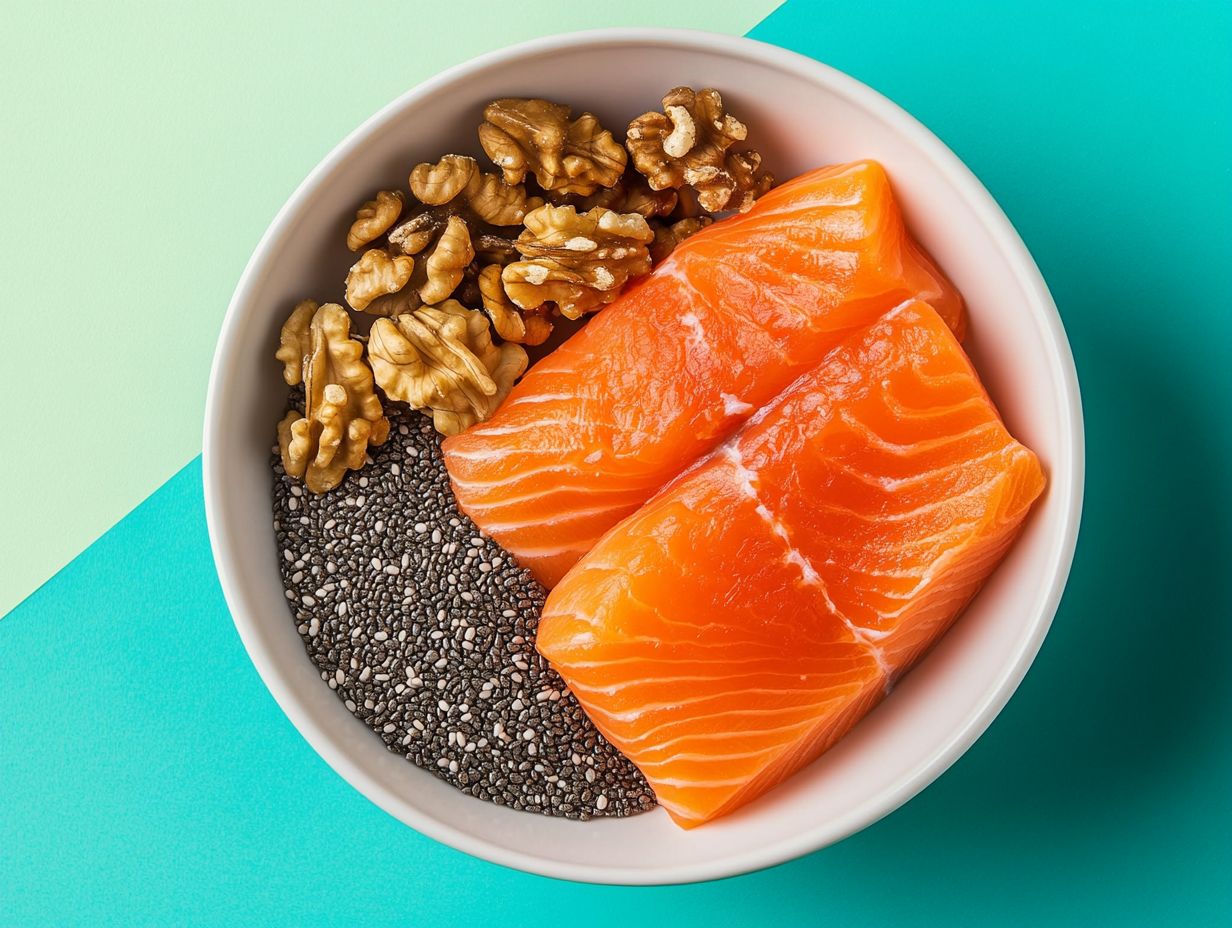Understanding the Role of Omega-3 for Anxiety
Anxiety impacts millions and prompts many to seek effective solutions. This article delves into anxiety disorders, helping you recognize its signs and symptoms, including the role of omega-3 fatty acids.
A central theme is the fascinating connection between omega-3 fatty acids, including fish oil, and anxiety management. You’ll discover the best natural dietary sources of omega-3 and get expert guidance on the benefits of supplementation.
This piece also outlines natural remedies and lifestyle adjustments that can enhance your path toward a calmer state of being.
Contents
Key Takeaways:

What is Anxiety?
Anxiety is not just a passing worry. It s a mental health disorder that can envelop you in fear and apprehension, disrupting your daily life.
According to the Royal College of Psychiatrists, millions worldwide grapple with anxiety disorders. These can take many forms, such as generalized anxiety disorder, panic disorder, or social anxiety.
Often, these conditions don t appear alone. They frequently accompany depression, which can lead to feelings of isolation if left unaddressed.
The prevalence of anxiety has sparked significant research and public concern. Studies from 2015, 2016, 2018, and 2019 reveal its extensive impact on individuals and communities.
Defining and Identifying Anxiety
Understanding anxiety requires recognizing its many symptoms. These symptoms can disrupt your mental well-being.
Symptoms often fall into two categories: physical and emotional signs. Both can significantly impact your daily life.
If you have generalized anxiety disorder, you might feel persistent worry, fatigue, and irritability. You may also experience physical sensations like muscle tension and restlessness.
In contrast, panic disorder can cause sudden waves of overwhelming fear. These episodes often come with palpitations, shortness of breath, and even dizziness.
Recognizing these symptoms is essential for finding the right support and treatment. It’s easy to overlook these signs as mere stress or fatigue.
However, understanding these symptoms can illuminate the path toward better mental health management.
The Relationship Between Omega-3 and Anxiety
Research highlights a compelling connection between omega-3 fatty acids and anxiety. Dietary sources like fish oil can offer notable benefits for mental health.
Omega-3s, especially DHA and EPA, are linked with brain health. They may help alleviate anxiety symptoms and enhance overall mental well-being.
Studies show that people who consume higher amounts of omega-3s often report lower anxiety levels. This finding prompts further exploration into how these fatty acids affect brain development and mood regulation.
Research and Evidence

Multiple studies, including those published in esteemed outlets like Harvard Health Publishing and JAMA Network Open, present compelling evidence for the positive impact of omega-3 fatty acids on anxiety reduction.
These studies underscore the vital roles of docosahexaenoic acid (DHA), eicosapentaenoic acid (EPA), and alpha-linolenic acid (ALA) in enhancing mental health outcomes. For example, a randomized controlled trial a type of study that tests the effects of a treatment revealed that participants taking omega-3 supplements experienced significantly lower levels of anxiety compared to those on a placebo.
Researchers also found that higher concentrations of EPA in the bloodstream were linked to reduced anxiety symptoms. Collectively, these findings suggest that incorporating omega-3s into your diet may serve as an effective adjunct treatment for managing anxiety disorders, offering you a potential pathway to improved emotional well-being.
Omega-3 Sources and Supplementation
Identifying the optimal sources of omega-3 fatty acids, including fish oil and cod liver oil, is essential for anyone seeking to improve their mental health and achieve health benefits like inflammation reduction.
Best Sources of Omega-3
The finest sources of omega-3 fatty acids are fatty fish like salmon, mackerel, and sardines, along with fish oil supplements that deliver essential DHA and EPA.
These nutrient-rich choices contribute not only to your heart health and cognitive function but also promote inflammation reduction within your body, which can be beneficial for conditions like rheumatoid arthritis.
Take salmon, for instance; it s loaded with astaxanthin, an antioxidant that supports your skin health. Mackerel is another gem, brimming with protein and vitamin D. As for sardines, they don t just deliver a generous dose of omega-3s; they also offer a fantastic source of calcium, which is invaluable for strengthening bones.
While omega-3 supplements can certainly help bridge dietary gaps and support weight loss, nothing quite compares to whole food sources that provide a broader array of vitamins and minerals, fostering a more balanced nutritional profile. For optimal health, incorporating these foods into your daily meals is a wise and recommended choice.
Supplement Dosage and Recommendations
Thinking about omega-3 supplements? Here s what you need to know! It’s crucial to stick to the recommended dosages to reap the health benefits while avoiding any unwanted side effects.
Your individual needs for omega-3s can vary widely, influenced by factors such as age, weight, dietary habits, and any existing health conditions. Take the time to evaluate these elements when deciding on the right amount, ensuring it aligns with your personal health goals.
While omega-3s can provide significant advantages, overdoing it could lead to issues like bleeding complications or digestive disturbances. That’s why consulting a healthcare professional is essential; they can help you establish a safe and effective dosage tailored specifically to your unique circumstances, ultimately enhancing both your mental well-being and physical health.
Other Natural Remedies for Anxiety

Explore various natural remedies for anxiety! This opens up additional pathways to relief, including alternative treatments and lifestyle adjustments that enhance mental well-being.
Embracing these options can empower you to cultivate a more balanced and serene state of mind.
Alternative Treatments and Lifestyle Changes
Alternative treatments and lifestyle changes can manage anxiety. They offer holistic approaches that enhance your mental health and overall well-being.
For example, incorporating yoga into your daily routine not only improves your physical flexibility but also fosters mindfulness. This practice allows you to cultivate a sense of inner peace. Even short sessions of meditation can serve as a grounding technique, gently steering your mind away from racing thoughts and ushering in a state of relaxation.
Herbal supplements like chamomile or valerian root may provide calming effects, but it’s crucial to consult with a healthcare provider before diving in. Making significant dietary adjustments like cutting back on caffeine and sugar while increasing your intake of fruits and vegetables can also contribute to mood stability.
Regular exercise boosts endorphins. It plays a positive role in managing anxiety levels, reducing symptoms of asthma, and enhancing your overall mental resilience. Whether it s a leisurely walk, an exciting dance session, or participating in team sports, staying active is beneficial.
Frequently Asked Questions
How can Omega-3 make a difference in managing anxiety?
Omega-3 is a type of fatty acid that is essential for brain and nerve function. It has been found to have a positive impact on reducing anxiety symptoms and promoting emotional well-being. Additionally, it may provide potential support for individuals with rheumatoid arthritis.
How does Omega-3 help with anxiety?

Research suggests that Omega-3 helps to regulate neurotransmitters in the brain, such as serotonin and dopamine. These neurotransmitters play a role in mood and anxiety. Omega-3 also has anti-inflammatory properties that can reduce stress and anxiety responses in the body, helping those with conditions such as asthma and heart disease.
Can Omega-3 supplements be used as a treatment for anxiety?
Omega-3 supplements can support traditional treatments for anxiety, but they should not be the sole method of treatment. Always check with a healthcare professional before starting any new supplement!
What are some food sources of Omega-3?
Fatty fish like salmon, tuna, and sardines are rich in Omega-3. Other sources include flaxseeds, chia seeds, walnuts, and soybeans. It is recommended to include these foods in a balanced diet for overall health and well-being.
Can Omega-3 help with other mental health conditions?
While there is evidence to suggest that Omega-3 can be beneficial for anxiety, it may also have positive effects on other mental health conditions such as depression, bipolar disorder, and ADHD. However, more research is needed in these areas.
Is there a recommended dosage of Omega-3 for anxiety?
The recommended dosage of Omega-3 for anxiety varies, but the general consensus is to aim for 500-1000mg of combined EPA and DHA (two types of Omega-3) per day. It is best to consult with a healthcare professional for personalized recommendations.






